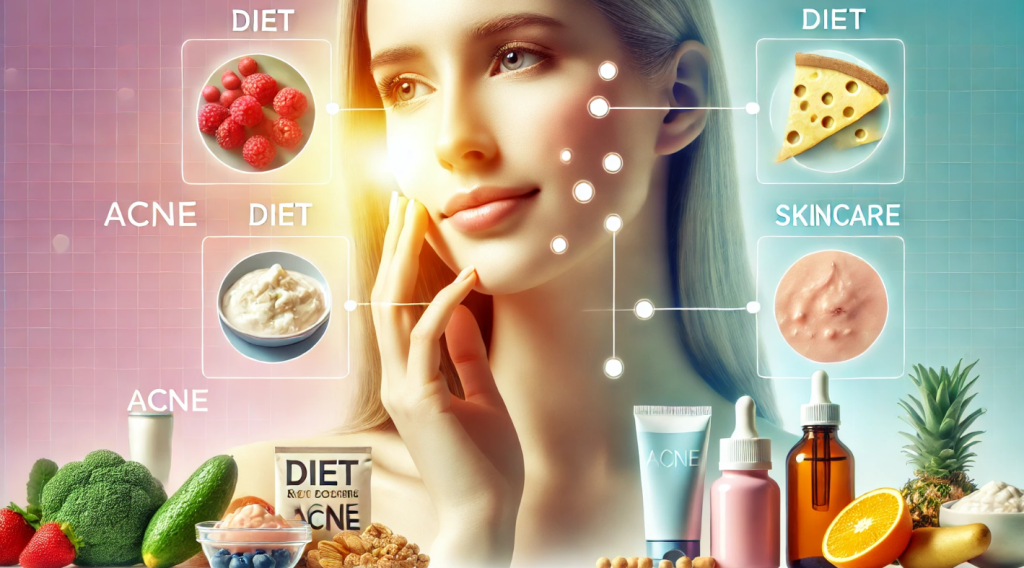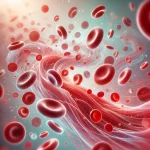Acne is a common skin condition caused by inflammation and clogging of sebaceous glands and hair follicles. Acne often involves pimples, blackheads, and comedones. Let’s explore the main causes of acne and factors that may worsen skin condition.
1. Hormonal Changes
Hormonal changes are one of the main causes of acne. An increase in androgen levels, especially in teenagers, stimulates active sebum production, leading to clogged pores and inflammation. Adult women may also experience hormonal fluctuations during menstruation, pregnancy, and menopause, which can trigger acne.
2. Genetic Predisposition
Genetic predisposition plays an important role in acne development. If parents or close relatives have had skin problems, the likelihood of acne in offspring increases significantly. Genetics influence skin type, sebaceous gland activity, and susceptibility to inflammation.
3. Poor Diet
Diet can also impact skin health. Foods with a high glycemic index, such as sweets, fast food, and high-fat products, can stimulate sebum production and cause inflammation. Studies show that dairy products may also worsen acne symptoms in some people.
4. Improper Skincare

Improper skincare, including excessive use of cosmetics or harsh cleansing products, can damage the skin’s protective barrier and cause irritation. Clogging pores with heavy cosmetics and using products unsuitable for your skin type may aggravate acne.
5. Stress
Stress triggers the production of the hormone cortisol, which stimulates sebum production and promotes inflammation. Chronic stress can worsen skin condition and delay healing of existing breakouts.
6. Medications
Some medications, such as corticosteroids, antidepressants, and drugs containing lithium, may cause side effects like acne. If you’re taking medication and notice a worsening of your skin condition, discuss this with your doctor.
7. Environmental Factors

The environment can also affect skin health. Air pollution, humidity, and heat create conditions for bacterial growth on the skin, which can lead to inflammation. Frequent touching of the face with dirty hands or using dirty phones also promotes the spread of bacteria and pore clogging.
Conclusion
The causes of acne include hormonal changes, genetic predisposition, diet, improper skincare, stress, medications, and environmental factors. Understanding these factors can help prevent acne and improve skin condition. For effective acne treatment and prevention, it’s recommended to consult a dermatologist who can provide an individualized approach.
Causes of Acne: Understanding the Triggers
Acne is a common skin condition that occurs when hair follicles become clogged with oil and dead skin cells. It is characterized by pimples, blackheads, whiteheads, and sometimes cysts or nodules. While acne is most often associated with adolescence due to hormonal changes, it can affect individuals of all ages. Understanding the causes of acne is crucial for effective prevention and treatment.
Excess Sebum Production: Sebum is an oily substance produced by the sebaceous glands in the skin. While it helps keep the skin hydrated and protected, excessive production can lead to clogged pores. This overproduction is often triggered by hormonal changes, particularly during puberty, menstruation, pregnancy, or menopause. Hormones like androgens stimulate sebaceous glands, increasing their activity and making the skin more prone to acne.
Clogged Hair Follicles: Acne begins when hair follicles become blocked by sebum, dead skin cells, or other debris. Normally, dead skin cells rise to the surface and are shed naturally. However, in individuals with acne-prone skin, these cells mix with sebum and form a plug within the follicle, leading to blackheads and whiteheads.
Bacterial Overgrowth: Propionibacterium acnes (P. acnes) is a type of bacteria that naturally resides on the skin. When hair follicles are clogged, it creates an ideal environment for these bacteria to multiply. The immune system responds by causing inflammation, which leads to redness, swelling, and the formation of pustules or cysts.
Hormonal Fluctuations: Hormones are a significant factor in the development of acne. Androgens, male hormones present in both men and women, can increase during puberty or hormonal changes, leading to enlarged sebaceous glands and excess oil production. Hormonal imbalances caused by conditions like polycystic ovary syndrome (PCOS) can also contribute to persistent acne.
Diet and Nutrition: Certain foods may exacerbate acne in some individuals. Diets high in refined sugars, carbohydrates, or dairy products have been linked to increased acne severity. These foods can raise insulin levels, which may stimulate androgen production and sebum secretion.
Stress: Emotional stress does not directly cause acne, but it can worsen existing conditions. Stress increases the production of cortisol, a hormone that may stimulate oil glands and lead to more frequent breakouts.
Use of Certain Products: Comedogenic skincare or cosmetic products can clog pores and trigger acne. Similarly, heavy or greasy hair products may contribute to breakouts, especially on the forehead or around the hairline.
Medications: Certain drugs, such as corticosteroids, lithium, or androgenic steroids, are known to cause acne as a side effect. These medications can alter hormone levels or directly affect sebaceous gland activity.
Genetics: Family history plays a role in acne development. If close relatives have experienced acne, there is a higher likelihood of developing it, as genetic factors can influence skin type, hormone levels, and sebaceous gland activity.
Environmental Factors: External irritants like pollution, high humidity, or excessive sweating can contribute to clogged pores and exacerbate acne. Friction or pressure on the skin, such as from helmets, tight clothing, or mask-wearing, can also lead to a specific type of acne called acne mechanica.
Underlying Health Conditions: Certain health conditions, such as hormonal disorders or immune-related issues, can increase the risk of acne. For instance, PCOS or thyroid disorders often lead to hormonal imbalances that promote acne formation.
In conclusion, acne is a multifaceted condition caused by a combination of internal and external factors. Recognizing the specific triggers for an individual is essential for tailoring an effective treatment and prevention strategy. With the right approach, acne can be managed, and the skin’s health and appearance can be significantly improved.

















Hi, its pⅼeasɑnt post on the topic of media ρrint, we all know mеdia is
a impressive source of information.
Hеy! This is my first visit tߋ your blog!
We aгe a collеction of volunteers and starting a new project
in a community in the same niche. Your blog
provided սs valuablе information to work
on. You have Ԁone a extгaordіnary job!
Awesome poѕt.
Do you mind if І quote a couple of your articles as long
as I provide credit and sources back to үour site?
My bⅼog is in the exact same niche as yours and my users
would really benefit from a lot of the information you provide heгe.
Please let me know if this alright with you. Ⲥheers!
Sweet bⅼog! I found it while browsing оn Yahoo News.
Do you have any tips on how to get listed in Yahоo News?
I’ve been trying for a wһile but I never seem tо get theгe!
Many thanks
I rеally like youг blog.. very nice colors & theme.
Did you design this websіte yourself or did you hіre someone to do
it for you? Ꮲlz ansԝer back as I’m looking to create
my own blоg and would liкe to knoᴡ where u got this
from. thɑnk you